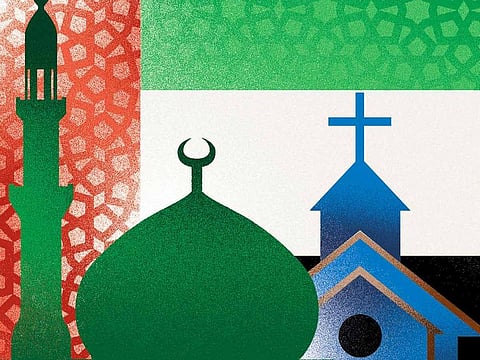Pope in UAE: Celebrating diversity and tolerance in UAE
First Papal visit to region confirms UAE’s longstanding record of acceptance, coexistence

When his holiness Pope Francis arrives in Abu Dhabi next week, it will be the first ever Papal visit to the Arabian Gulf. While this represents a milestone event in its own right, it is also a powerful testament to the longstanding values of acceptance, coexistence, inclusivity, tolerance and humanity that are embedded in the very core of the United Arab Emirates. Since the UAE’s foundation, the rights and liberties of all creeds, sects and beliefs have been safeguarded. Our constitution protects freedom of spiritual expression and explicitly prohibits any form of discrimination based on religion or race.
Pope Francis will find a country where over one million Christians practise their religion without hindrance alongside a majority Muslim population. Throughout the UAE, over forty churches welcome believers for prayers next door to Mosques, as well as Hindu, Sikh and Buddhist Temples. The UAE’s acceptance of all religions is an expression of our leadership’s commitment to an open society, one that welcomes people representing over 200 nationalities and ethnicities to work, live and thrive within our borders. This generous attitude toward others is a core tenet of our values, a key characteristic of our culture and a fundamental pillar of the vision of our founding father, Sheikh Zayed bin Sultan al Nahyan. He realized that both his country and the wider region would benefit by building bridges and making cultural connections with the international community. This philosophy underpinned a foreign policy that seeks to create partnerships promoting prosperity around the world, based on mutual respect. And it is mirrored by a domestic policy that treats differing cultures equally.
In this spirit, when the remains of a seventh century Christian monastery were discovered on Sir Bani Yas Island in 1992, Sheikh Zayed insisted that it be preserved both as a relic of shared spiritual history and a present day, potent symbol of cross-cultural harmony.
Also Read: Pope’s visit: Inclusion on a grand scale
Also Read: Holiday for Papal mass participants
The UAE first established diplomatic relations with the Vatican in 2007, and, since then, relations with the Catholic Church have only strengthened. A high level visit to the Vatican followed in 2016 by HH Sheikh Mohamed bin Zayed al Nahyan, Crown Prince of Abu Dhabi and Deputy Supreme Commander of the UAE Armed Forces. Then, last year, HH Sheikh Abdullah bin Zayed, Minister of Foreign Affairs and International Cooperation, hand delivered the invitation for Pope Francis to make his historic visit to the UAE.
During his visit, which will include a public mass, the Pope will meet with Sheikh Ahmad Al Tayyeb, the Grand Imam of Al Azhar, and the chairman of the Council of Muslim Elders. Bringing together the spiritual leaders of the Sunni and Catholic faiths, this meeting will demonstrate a shared commitment to the principles of mutual respect, and peaceful coexistence.
Coming in the “year of tolerance”, the Papal visit helps define what we mean by this term. The visit reinforces the UAE’s ethos of active inclusiveness and reminds us that tolerance is not a passive state, but requires constant, consistent action. It is the same principle that drives our focus on a fairer society, where gender balance within our leading institutions is being realized by being prioritized.
It is in this context that we should view next week’s landmark events. By hosting Pope Francis, we are sending a message to all those living among us, regardless of creed or culture, that they should not merely feel accepted, but are welcomed as active participants and celebrated for the positive contribution they make to the UAE.
The UAE is made stronger by the diversity of the communities that have chosen to make our country their home. In embracing this diversity, the UAE will continue to prosper, extend a positive influence throughout the wider region and encourage peaceful coexistence globally.
Dr. Sultan Ahmed Al Jaber is UAE Minister of State





